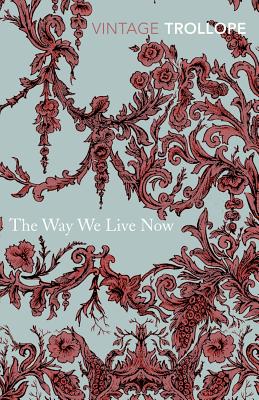
Last night, I went to Community Bookstore to see Chris Abani and Victor LaValle engage in a wide-ranging conversation that was both informative and inspiring. The only downside: the cough I’d been feeling for part of the day turned into something a little more tenacious, and by the end of the night, I was ready to head home and pass out. Today, I’m feeling mildly delirious. All of this is to say that if I begin somehow losing track of plot details — or, worse, somehow conflating Anthony Trollope’s The Way We Live Now and Sergei Lukyanenko’s Night Watch — rest assured that the former is a satire about easy money and swindling in 19th-century England, while the latter is about a fragmenting stalemate between rival supernatural forces in contemporary Moscow, a kind of Cold War with magicians and werewolves glaring testily across ideological lines. Or maybe not. Again: borderline-hallucinating here.
Anthony Trollope falls into the realm of writers I’ve meant to read, but haven’t. On a trip to Powell’s in late 2012, I ended up buying a couple of late-19th/early-20th-century novels, several of which I’d first encountered in a Robertson Davies essay collection. (Vanity Fair and A Glastonbury Romance were the others; the fact that, in the year and change since the trip, I’ve only managed to read one of them might suggest a moral failing on my part. We’ll see. The fact that each of these, especially A Glastonbury Romance, is enemy-smiting-size, doesn’t help. (I’m still waiting for someone to codify carrying large books on long subway commutes as a revolutionary new workout mechanism. I think there’s money to be had there.)
Anyway. The Way We Live Now. It’s big, and dense, and satirical — the very quick summary would be that it’s about the effects of the arrival of Augustus Melmotte, a financier of vague reputation, on the London scene, and how that affects the fortunes of one family and several of their friends. Over the course of 800-odd pages, characters attempt to affect one another’s fortunes: there are speculative business ventures and multiple marriage proposals (sometimes involving the same person) and literary rivalries. And while these are not necessarily the most pleasant characters to spend time with, Trollope minutely dissects their motivations and goals; it leads to an understanding of them, even if that doesn’t come with admiration.
Night Watch, on the other hand, is much more over-the-top — even as it couches that in a narrative of bureaucracy. Structured, more or less, as three distinct narratives, the book follows a magician living in post-Soviet Moscow, workin as part of an organization charged with maintaining a balance between good and evil. And so, for all that there are chase scenes and tense standoffs, there are also moments where characters debate appropriate steps and the motivations of their mission. It has the feel of a good spy novel, even with vampires, werewolves, and magic lurking in the margins. And the conclusion both wraps up the book in a satisfying way and sets up larger conflicts to come.
Follow Vol. 1 Brooklyn on Twitter, Facebook, Google +, our Tumblr, and sign up for our mailing list.
